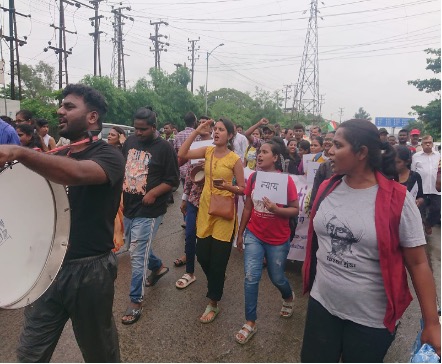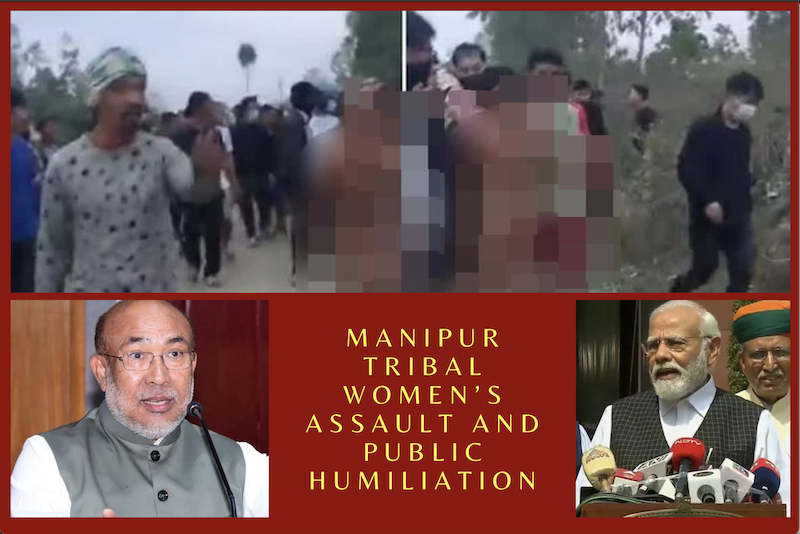Manipur’s series of atrocities had apparently been hidden from the public for two months
The topic of gender violence in India, given its violent and graphic nature, is at once taboo but prevalent and commonplace. It is a source of deep discomfort among India’s more cosmopolitan and egalitarian-minded citizens, and for its international allies. It is also in juxtaposition to its great Buddhist traditions of dissolving gender biases and transcending differences.
The ongoing series of gender atrocities in Manipur, India, have given way to a broader, renewed conversation about the way women are treated in the country.
On 19 July 2023, a horrifying video surfaced on social media of two women from the Kuki tribal ethnic group being paraded naked by hundreds of men from the Meitei. They had been apparently sexually assaulted before their public humiliation.

Seven accused, including one juvenile, have been arrested so far. “The state police is making an all-out effort to arrest the remaining culprits by conducting raids at many suspected hide-outs,” the Manipur police tweeted on 24th July 2023.
The incident is said to have taken place on 4 May 2023 and a First Information Report (FIR) was filed on 18 May against “900-1,000 unknown miscreants.” However, no action was taken until the video came out on the internet. The 26-seconds video brings light to hidden atrocities happening in Manipur over the past two months and beyond.
Many survivor Kuki women in Manipur have come out to say that they were raped by Meitei men as reprisals for their women being raped by Kuki men. “In Lamka area, your people raped my people, therefore, we are going to do the same to you people,” a woman who witnessed the attack was told by the Meitei mob. It would seem we are witnessing a disturbing phenomenon called “revenge rapes.” These can be instigated by fake news, rumor-mongering, and hearsay, and serve as means to exert power in a violating and brutal manner. (The Quint)
According to a report in The Print, the incident was a revenge rape after a doctored photograph of a woman’s dead body wrapped in plastic circulated on the Internet, with the claim that it was the body of a woman from the Meitei that had been sexually assaulted and killed by people from the Kuki tribe. The Print also shared a report from a fact-checking website that found the photo to be from an old honor killing incident from Delhi.
Besides this particular case, several other cases of rapes, beheading, burnings, vandalism, and lynchings have occurred since May 2023, with increasing numbers of whistleblowers emerging. The next day after the video surfaced on the internet, the chief minister of Manipur, N Biren Singh, admitted on national television that the incident of sexual assaults against women was not an isolated one. “There are hundreds of such cases happening here. That is why the Internet is banned in the state,” he said. He further added that a thorough investigation has begun and that the state will ensure strict action against all the perpetrators.
The Kuki rights groups, along with some of Mr. Singh’s own BJP lawmakers, have accused Mr. Singh, himself of the Meitei, for failing to tackle the violence. Reports have revealed that over 160 people lost their lives and more than 50,000 were displaced after the ethnic violence that broke out in the state on 3 May, when a “Tribal Solidarity March” was organized in the hill districts to protest against the Meitei community’s demand for Scheduled Tribe (ST) status.
Soon after the first video of the women’s naked parade went viral, women of the Meitei set ablaze the house of Huirem Heradas, who was the first identified accused, in Tuinomkhopi, Manipur, on 21 July. Since the exposure of Manipur’s hostile conditions, many around the world have renewed unfavorable observations about the safety of India for women.
Women in Manipur are socio-politically vulnerable, and have been victims of sexual harassment by the Indian Army. But they have always been at the forefront of leading campaigns on political or social issues. They have made strides and have a strong foothold in the state, often acting as powerful influencers in the state. Earlier, there were strong protests where Manipuri women voluntarily stripped nude protesting against the Indian Army, with a banner that read “Indian Army Rape Us.” Women in Manipur have also led the battle against drug menace, human rights violations, corruption, the Armed Forces (Special Powers) Act (AFSPA), and the Citizenship Bill in the northeastern state.
The viral video served as a wakeup call to the nation, forcing PM Narendra Modi to finally break his long lasting silence about the Manipur riots and talk about the heinous crimes. About 15,000 protesters across the nation, including several individuals, sports persons, film actors, defense officers, and social activists have raised voices for Manipur, making an appeal to the state and central government to resolve the issues as soon as possible. There are protests and marches organized across the nation, demanding an end to the violence.


Although there have been very strong female voices against gendered violence in India, there have been no lessening of violence against women. This is particularly true for the scheduled castes and scheduled tribes in India. As these women belong to the lowest position of the social stratification and share double the burden of caste and gender, they are prone to be the easiest targets for sexual harassment, rape, and other forms of gendered violence on a regular basis.
See more
‘They Knocked Me Unconscious’: Manipur Rape Survivor on Abduction, Assault (The Quint)


